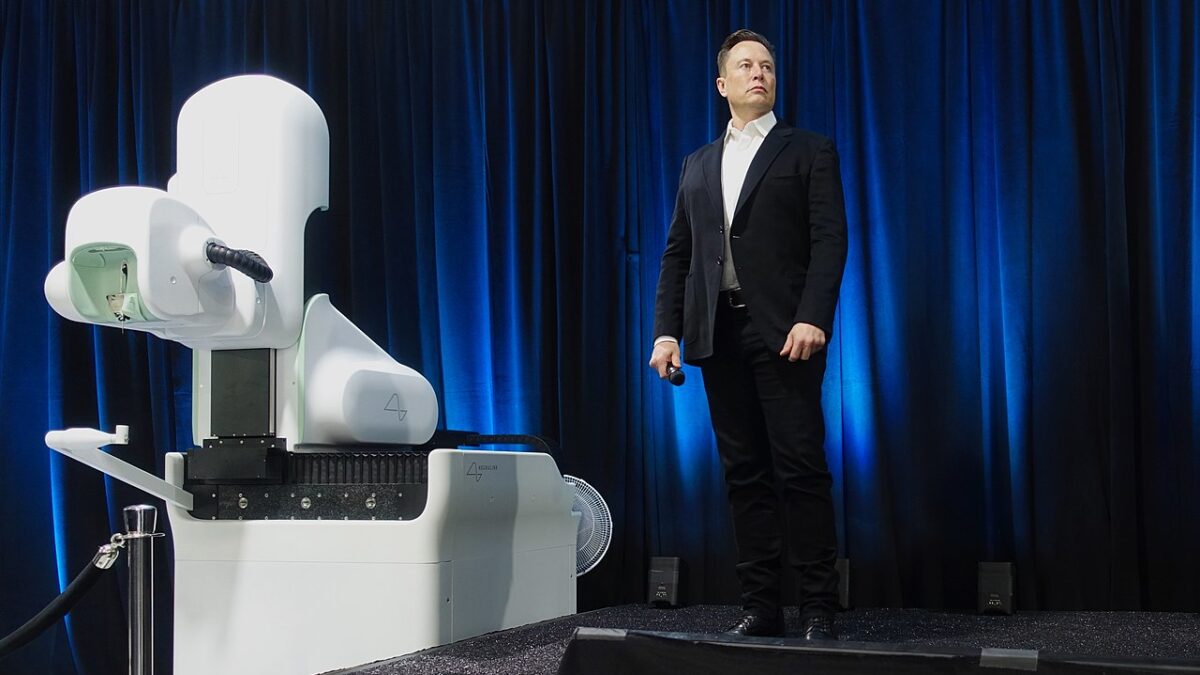Humanity quietly crossed a threshold this week when Elon Musk announced on X that the first person has received a Neuralink brain implant. “Initial results show promising neuron spike detection,” said Musk, later adding that the first Neuralink product is called Telepathy, which enables “control of your phone or computer, and through them almost any device, just by thinking.”
Initial users of Neuralink, which Musk co-founded, will be people who have lost use of their limbs, giving a veneer of altruism to what is actually a radical project to merge humans with machines. “Imagine if Stephen Hawking could communicate faster than a speed typist or auctioneer,” Musk wrote on X. “That is the goal.”
But that’s not really the goal. The goal is to usher in a transhuman future by creating human-machine hybrids that will be “superior” to natural or non-enhanced humans. Musk and other tech futurists — some 40 other companies besides Neuralink are working on computer-brain interfaces — don’t exactly describe what they’re doing this way. It sounds creepy. Much more innocuous sounding to say you’re just helping disabled people with exciting new digital technology.
In reality, what Musk and Neuralink are doing amounts to building a second Tower of Babel or a revisiting of the serpent’s offer in the Garden of Eden: You will not surely die, you will be as gods. They want godlike intelligence and, ultimately, eternal life — and they’re willing to tinker with the human body and mind, deconstruct and reconstitute it even, if that’s what it takes.
Musk is smart enough not to come out and say all this plainly. Maybe he realizes most people will rightly think it off-putting, even wicked. Others are not so savvy. Bryan Johnson, a Silicon Valley tech mogul, is quite open about his quest for immortality. He was the subject of a lengthy Time magazine profile in September that chronicled his bizarre, insanely strict regimen for slowing or reversing the aging process.
Johnson, 46, is a modern-day Dorian Gray. He spent millions developing an anti-aging system he calls Blueprint, which involves turning over day-to-day decisions (what and when he eats, when he sleeps, how much sunlight he gets) to an anti-aging algorithm he believes will reverse the aging process. He’s turned his own life into an experiment to see if he can cheat death.
But his project is about more than just himself. He envisions a future in which humans have merged with AI, or even serve AI. Indeed, Johnson himself has given over his life to an AI algorithm, which he obeys with perfect fealty — you might even say he worships it — in hopes of gaining eternal life. He thinks this is the inevitable future of all humanity; he just wants to be first to take the plunge.
A clip of Johnson on a recent podcast circulated widely on social media this week. In it, he is straightforward about all this. He says things are “about to change radically.” What he calls “Gen Zero” is about to emerge, a group of “multi-ethnic, multinational people” who are “willing to divorce from ourselves all human norms, all human customs, all human thought, and we’re willing to say: We’re wide open. About everything. Absolute blank slate.”
The clip was widely panned for its naiveté and historical ignorance, as if every revolutionary since the Paris Commune hadn’t said more or less the same thing. But while it’s easy to mock Johnson for his “real-communism-has-never-been-tried” ethos, it’s not as easy to dismiss the movement he describes, because it’s not just crackpots like him but also powerful people like Musk who are putting real resources into creating a transhuman future.
What will such a future look like? Yuval Noah Harari, the creepy underling of World Economic Forum chief Klaus Schwab, has an idea. He once described a future in which ever more powerful computing technology will create a massive new class of what he called “useless people” who will need to be “kept happy with drugs and computer games.” Harari has also said the future will bring a new class of what he believes are superhuman beings, which he describes as “entities that are more different from us than we are different from chimpanzees.”
In a 2021 interview with Anderson Cooper, Harari declared that we will “soon have the power to re-engineer our bodies and brains, whether it is with genetic engineering or by directly connecting brains to computers, or by creating completely non-organic entities, artificial intelligence which is not based at all on the organic body and the organic brain. And these technologies are developing at break-neck speed.”
And of course, this future will usher in an almost unimaginable level of inequality, Harari says, a “real biological inequality” such that “Homo sapiens will split into different biological castes because they really have different bodies — and different abilities.”
This post-human future isn’t something Harari is afraid of or is merely trying to warn us about. It’s a future he seems at times to be looking forward to. He tells Cooper that massive biometrical data collection is “not just dystopian. It’s also utopian,” because it will produce better health care.
It’s easy to caricature Harari, but he speaks for an entire class of tech futurists who share his materialist view of mankind as infinitely malleable and upgradable. During the recent annual meeting of the WEF in Davos, Switzerland, a clip of a TED talk by Harari made the rounds on social media. In it, he made the bold claim that only material things are real, that “kidneys and mountains are real,” but human rights are not. Human rights, he says, are “just a story.” Imagine being so committed to materialism that if you can’t cut open a human being and see “human rights” inside, then they must not be real.
Hearing this kind of talk from global intellectual leaders like Harari, one is reminded of C.S. Lewis’ famous passage from The Abolition of Man, about natural law or what Lewis calls the Tao, that it is “not one among a series of possible systems of value. It is the sole source of all value judgments. If it is rejected, all value is rejected. If any value is retained, it is retained.” What purport to be new value systems or ideologies “all consist of fragments from the Tao itself, arbitrarily wrenched from their context in the whole and then swollen to madness in their isolation, yet still owing to the Tao and to it alone such validity as they possess.”
What Harari and Johnson and Musk and all who sail with them are really proposing is something not radical or new, but in fact very old. What they offer is not just materialism but paganism, repackaged for the digital age. Of course, they do not call it that, perhaps because they lack the theological and historical vocabulary to articulate what it is they really believe. But the properly catechized person can recognize that their belief system is fundamentally pagan — as well as some of their practices. (Johnson, the Time profile reveals almost as an aside, was at one point regularly ingesting his own 18-year-old son’s blood in the belief it would halt or reverse his aging. Now what does that remind you of?)
Recall that paganism has always been at heart materialistic, not only because it locates the divine in the physical, as opposed to the transcendent, but also because it proclaims that there is no objective truth, moral or even physical. There is only will and power. The pagan’s creed, so far as he has one, is the famous line attributed to the ninth-century Arab warlord Hasan i-Sabbah and popularized in Vladimir Bartol’s 1938 novel, Alamut: “Nothing is true, everything is permitted.”
So when Musk talks about how Neuralink will help quadriplegics and people with Parkinson’s, or when Harari waxes poetic about how great subcutaneous implants will be for health care, or when Johnson glories in our imminent AI-dominated future, understand what they are really talking about. Neuralink will not be for the huddled masses, for Harari’s “useless people.” It will be for him and his fellow neopagan elites.
You can dress paganism up in Silicon Valley jargon, you can give it a veneer of respectability and technical expertise, but in the end, it brings about what pagan societies have always brought about: oppression, exploitation, and slavery on a mass scale. They will call it something else, post-human or transhuman. But the suffering such a world will inflict on mankind will be the old-fashioned kind: 100 percent human.









